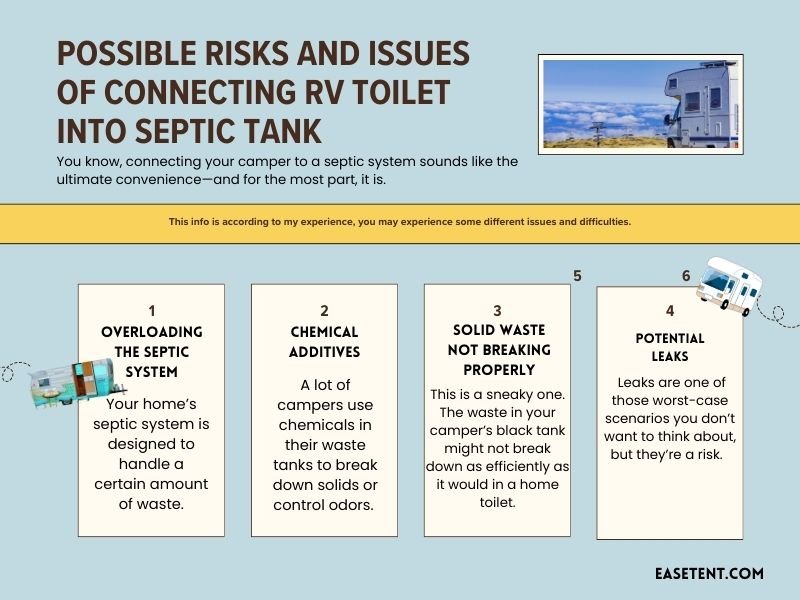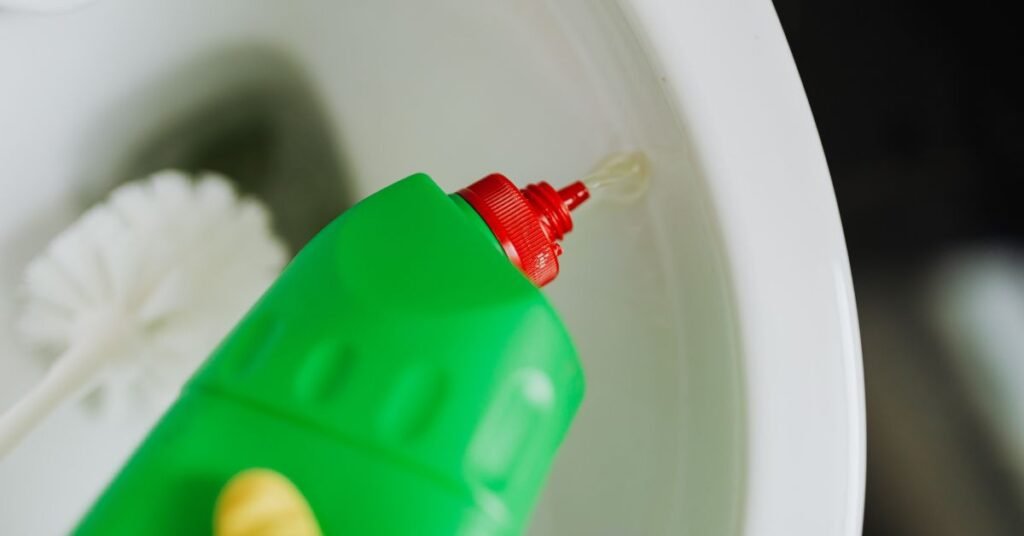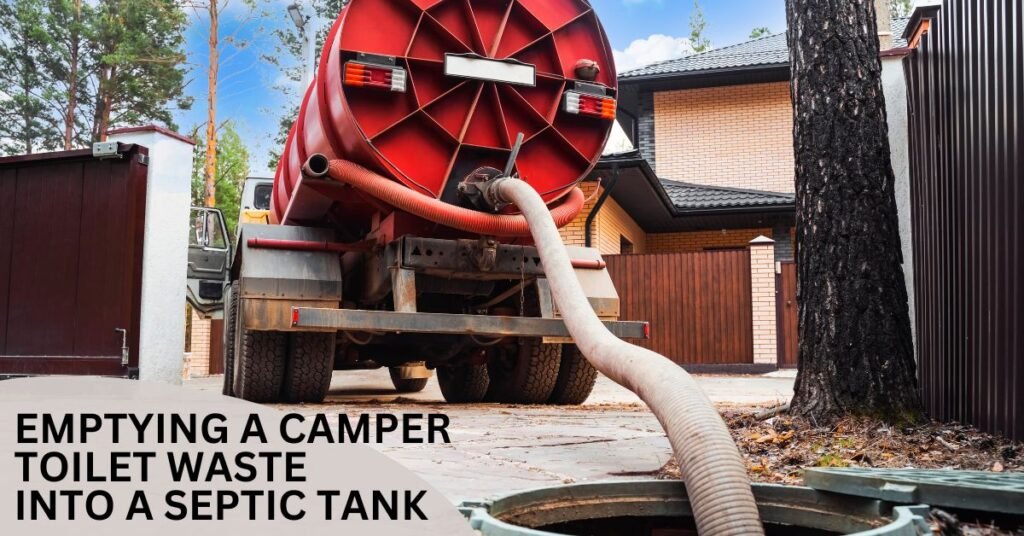You’ve parked your camper at the perfect campsite, and now it’s time to get everything set up. One of the most important tasks? Connecting your camper to the septic system. It might not be the most exciting part of camping, but it’s key to a smooth and hassle-free trip. Once you get it right, you won’t have to worry about anything except enjoying the outdoors. Let’s walk through what you need to know so you can set it up quickly and easily.
Table of Contents
Is it possible and safe to empty a portable toilet into a residential septic system?

“I’ve been a camping influencer for the past 6 years, and I’ve gotten a lot of DMs asking, ‘Can we empty our camper toilet into a septic tank?’, especially after a camping trip or a tailgate party. So, is it possible? In short yeah, it is. In fact, people do it all the time. You just connect the right hoses and follow a few steps.
But here’s the kicker—is it safe? Well, that’s where things get a little tricky. If you’re just doing it occasionally, it’s usually fine, however, there are some important things to keep in mind.
The Impact of Chemicals on Your Septic System
First off, your septic system is designed to break down human waste, right? But what a lot of people don’t think about is that portable toilets often use chemicals to control odors or break down solids. And those chemicals? They can seriously mess with the bacteria in your septic system, the bacteria that are literally doing all the heavy lifting to break down the waste. Without them, your septic system could get clogged or stop working properly. Nobody wants to deal with that!
Capacity Consideration
Also, you have to think about capacity. Portable toilets don’t hold as much waste as your regular household plumbing, but if you’re emptying them into the septic system too often, you could overload it. Septic tanks need time to process the waste, and if you keep dumping in large amounts, it might cause backups—and let me tell you, dealing with a septic backup is not fun.
Is it Possible & Safe for you?
So what’s the conclusion? It’s possible and usually safe if done carefully and with the right precautions. Just be cautious about the chemicals you’re putting in there and don’t do it too often.
If you’re emptying it regularly or using heavy-duty chemicals, maybe consider an alternative like a public dump station. They’re designed for this kind of thing, and they’ll give your septic system a break!
How can you connect a Camper to a Septic System?

You’ve got your camper all set up, maybe you’re parked in a cozy spot by the woods or staying long-term on some land. But there’s one thing that might be nagging at the back of your mind—how do you connect your camper to a septic system? I get it. It’s not the most glamorous topic, but trust me, getting this right can save you a ton of headaches down the road.
So, first things first: it’s totally possible to connect your camper to a home’s septic system. And it’s pretty convenient too, especially if you plan on staying in one place for a while. But before we dive into the how, let’s talk about why this is such a game-changer.
When you’re connected to a septic system, you don’t have to stress about finding dump stations or dealing with overfull holding tanks. You’re basically running your camper like a small house—flushing the toilet and letting water from your sink drain without a second thought. That’s the dream, right?
The Basics of Connecting
Here’s the general process, and honestly, it’s not as complicated as it sounds:
- Locate the Cleanout Port
- This is where you’ll be hooking up your trailer. It’s usually a PVC pipe sticking out from the ground, typically near the house. Sometimes it’s capped off, so you might need to unscrew the cap.
- Get the Right Hose and Attachments
- You’ll need a heavy-duty sewer hose that connects from your camper’s waste outlet to the septic system’s cleanout port. Make sure it’s long enough and properly sealed to avoid leaks. The last thing you want is a messy spill in your yard—trust me on that.
- Empty Black Water First
- Always start by emptying your black water tank (that’s the one with sewage from your toilet). It’s essential to do this before anything else so you avoid any unwanted surprises. Once it’s emptied, then you can go ahead and drain the gray water (from sinks and showers). This helps rinse out the hose, keeping everything a little cleaner.
- Use a Vent Pipe
- If you plan on leaving your camper hooked up for an extended period, you may want to add a vent pipe. It’ll allow gases to escape from the system, avoiding pressure buildup or odors creeping back into your RV.
Things to Keep in Mind
Here’s the part where we get real. While it’s convenient to be hooked up, you need to be mindful of your septic system’s capacity. If your camper is constantly feeding waste into the system, especially if you’re hosting guests or using it heavily, it could overwhelm the tank.
Also, not all septic systems are created equal. If your home’s system is older or wasn’t designed for high bulk, you might need to pump it more frequently. And, of course, keep an eye on the chemicals you use in your camper’s waste tank. Some can kill the helpful bacteria that make the septic system run smoothly. You really don’t want that!
Final Thoughts
So yeah, connecting your camper to a septic system? Totally achievable and convenient. It gives you that extra freedom to stay in one spot for longer without worrying about your tanks filling up. Just make sure you take the proper steps and check your system’s limits, and you’ll be all set.
It’s a little bit of effort up front, but man, once you’ve got it connected, you’ll thank yourself every time you flush.
M Saif
Possible Risks and Issues
You know, connecting your camper to a septic system sounds like the ultimate convenience—and for the most part, it is. But, like with anything, there are some risks and issues that can pop up if you’re not careful. It’s not something to stress about, but definitely worth keeping in mind.

Overloading the Septic System
Here’s a big one. Your home’s septic system is designed to handle a certain amount of waste. When you start adding waste from your camper, you’re increasing the load. If your camper is hooked up for an extended period, especially if you have guests or are using more water than usual for any reason, the septic system can get overwhelmed.
If that happens, you could face backups or even damage to the system.
Imagine flushing your camper toilet, and instead of hearing that satisfying swoosh, you’ve got a backup to deal with. Nightmare, right?
The fix? Keep an eye on your water usage, and make sure your septic system is sized to handle the extra load.
Chemical Additives
A lot of campers use chemicals in their waste tanks to break down solids or control odors. And while they work great in the camper, those same chemicals can wreak havoc on your septic system. The bacteria in your septic tank are crucial for breaking down waste, and some chemicals used in campers can kill them off. Without those bacteria, your septic system can’t do its job properly.
So, if you’re going to be hooked up to a septic system, it’s super important to avoid harsh chemicals. Stick with natural, septic-safe treatments for your camper tanks. You don’t want to damage your whole system because of a little blue liquid!
At the end of 2018, I went on a week-long camping trip with friends, excited to escape into nature with our RV. We used chemical additives for the toilet, but halfway through, I learned the hard way that too much can lead to messy surprises. That’s why I tell you: don’t do it! Trust me, moderation is key when it comes to keeping things clean and your camping experience enjoyable!
My Own Story (25/July/2018)
Solid Waste Not Breaking Down Properly
This is a sneaky one. The waste in your camper’s black tank might not break down as efficiently as it would in a home toilet. That’s because campers tend to use less water and might store waste for longer periods before flushing. If those solids make their way into your septic tank, they might not break down as quickly, which could lead to clogs or system failure over time.
To avoid this, you can make sure you’re using enough water in your camper when flushing, and consider emptying your tanks more frequently if you’re connected for a long period.
Potential Leaks
Leaks are one of those worst-case scenarios you don’t want to think about, but they’re a risk. If your connections between the camper and the septic system aren’t sealed properly, you could have leaks—and not the kind of leaks you can just shrug off. Not only can it make a huge mess, but sewage leaks can also contaminate your yard and even become a health hazard.
Double-check your hose connections and keep an eye out for any weak spots in your setup to prevent leaks.
Septic System Maintenance Costs
Adding a camper’s waste to your septic system means more frequent pump-outs and potentially more maintenance. If you’re hooked up for months at a time, you might need to call a professional more often to pump the tank and check the system’s health. It’s not a huge deal, but it’s something to factor into your decision.
After all, no one likes unexpected bills showing up because of septic system trouble!
Are RV toilet chemicals safe for septic tanks?
This is a question that comes up a lot among RV owners. After all, nobody wants to do something that could harm their home’s septic system. So, let’s break it down!

Understanding RV Toilet Chemicals
First off, RV toilet chemicals are designed to manage waste and control odors in your camper’s black water tank. They often come in various forms—liquids, powders, and even tablets. These chemicals work by breaking down solid waste and keeping everything smelling fresh. Sounds great, right? But here’s where it gets a little complicated.
The Good and the Bad
The Good
Many RV toilet chemicals are formulated to be safe for septic systems. They contain enzymes and bacteria that help break down waste, which can actually be beneficial for your septic tank. When used correctly, some of these products can help keep the septic system running smoothly.
The Bad
However, not all RV chemicals are created equal. Some products are heavy on synthetic fragrances or contain harsh chemicals that can disrupt the natural bacteria in your septic system. You know, the very bacteria that do the hard work of breaking down waste? If those get wiped out, you could end up with a clogged system and all the unpleasantness that comes with it.
“As I mentioned earlier, you need to be careful when using chemicals, so I want to remind you once again to choose your RV products wisely.”
What to Look For
So how do you choose the right product? Here are some tips:
- Read the Labels
- Look for trailer toilet chemicals that specifically state they’re safe for septic systems. Keywords like “septic safe” or “biodegradable” are good signs.
- Avoid Formaldehyde
- This is one ingredient you want to steer clear of. It’s effective at killing bacteria, but that’s the opposite of what you want for your septic system.
- Opt for Natural Solutions
- If you’re really concerned, there are many natural or eco-friendly options on the market. These tend to use plant-based enzymes and are often gentler on your septic system.
Best Practices
Even with safe chemicals, it’s important to use them in moderation. Overusing any chemical, even if it’s labeled septic-safe, can lead to problems. Remember to also flush your RV toilet with enough water to help dilute the chemicals, and avoid mixing different brands or types of chemicals, as this can create unexpected reactions.
Final Thoughts
So, are RV toilet chemicals safe for septic tanks? Generally, yes, but it all comes down to the type of chemical you choose. Being informed and careful can help you enjoy the convenience of your RV without putting your septic system at risk.
Is It Right for You?

Alright, so you’ve been thinking about connecting your caravan to a septic system, but is it the right choice for you? Let’s break this down together because this is one of those decisions that can really influence your camping experience.
Consider Your Usage
First, think about how often you use your RV. If you’re just taking it out for a weekend here and there, you might not need the hassle of a permanent connection. In those cases, using dump stations could be simpler and more manageable for you. But if you’re planning a long-term stay or frequent visits to a particular spot, connecting to a septic system can offer you that sweet convenience.
Size of the Septic System
Now, let’s talk about the septic system itself. Is it designed to handle extra waste? If you’ve got a smaller tank or an older system, connecting your camper might not be the best idea. You don’t want to push it to its limits and risk creating a mess.
If you’re unsure, a quick chat with a septic professional can give you peace of mind.
Maintenance Commitment
Consider how much maintenance you’re willing to commit to. When you connect your camper to a septic system, you might need to monitor it more closely and schedule more frequent pump-outs. Are you up for that? If the thought of dealing with septic system maintenance feels overwhelming, it might be easier to stick to dump stations.
Environmental Responsibility
Don’t forget about the environmental aspect! If you’re passionate about protecting the environment, you might want to be cautious with the chemicals you use in your RV. Connecting to a septic system means being extra mindful of the products you choose to ensure you’re not harming the bacteria that keep it functioning. If this resonates with you, then it’s something to consider.
Final Thoughts
So, is it right for you? Only you can answer that. Take a moment to weigh the pros and cons based on your camping style, the specifics of your septic system, and how much maintenance you’re willing to take on.
FAQs
How much does it cost to empty an RV tank?
The cost to empty an RV tank typically ranges from $10 to $30, depending on the location and the facility you use. Some campgrounds may include it in their fees, while others charge separately.
Where do you empty an RV toilet?
RV toilets are emptied at designated dump stations, often found at campgrounds, truck stops, or RV parks. These stations are equipped to safely dispose of waste from your black and gray tanks.
How long can you leave waste in a black tank?
You can typically leave waste in a black tank for 3 to 7 days, depending on tank size and usage. It’s best to empty it regularly to avoid buildup, odors, and potential clogs.
Conclusion
Connecting your camper to a septic system isn’t just about convenience—it’s about maximizing your freedom while camping. With a few careful steps and an eye on safety, you can keep your adventure running smoothly without any hiccups. Whether you’re escaping for a weekend or settling in for a longer stay, mastering this setup will give you peace of mind and more time to enjoy the beauty of the great outdoors. So go ahead, set up that connection, and let the wilderness become your home away from home!
What kind of septic system do I need for my RV?
When you use the Bathroom on an RV where does it go?
Should you use Toilet Paper when Camping? A to Z Guide
What Should You Use Instead of Toilet Paper When Camping? Natural Pooping

